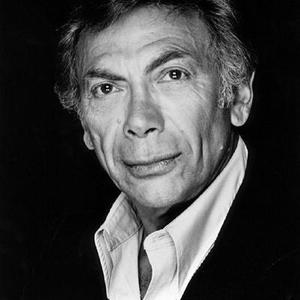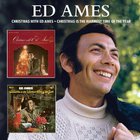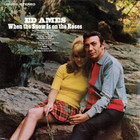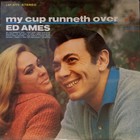Ed Ames

- Meta styles:
- Country-Pop, Show/Musical, Traditional Pop
- Style:
- Country-Pop
Ed Ames (born Edmund Dantes Urick on July 9, 1927) is an American popular singer and actor. He is best known for his Pop and Adult Contemporary hits of the 1960s like "When the Snow is on the Roses" and the perennial "My Cup Runneth Over." He also was originally part of a popular singing group of 1950s called The Ames Brothers. Ames was born in Malden, Massachusetts to Russian Jewish immigrant parents. He was one of nine children, five boys and four girls. Ames grew up in a poor household, but was educated in Classical and Opera music, as well as in Literature, such as Shakespeare.
Ames was born in Malden, Massachusetts to Russian Jewish immigrant parents. He was one of nine children, five boys and four girls. Ames grew up in a poor household, but was educated in Classical and Opera music, as well as in Literature, such as Shakespeare. Ames was very athletic as a child and teenager, but he always knew that music would one day become his future destiny, as well as for his brothers; Gene, Mac, Vic and Joe. Together, while still in high school, the brothers formed a quartet and often won competitions around the Boston area in Massachusetts. Three of the brothers later formed the Amory Brothers quartet and went to New York, where they were hired by bandleader Art Mooney. Abe Burrows, a playwright entertainer at the time who helped the brothers along the way, had suggested the brothers change their names to the Ames Brothers.
They were first signed on with Decca Records in 1948. However, because of the Musician Union's ban, their records from Decca were never released. Instead, they signed on with another label, Coral Records, a subsidiary of Decca. They had their first major hit in the 1950s with the double-sided "Ragg Mopp" and "Sentimental Me". Following this, the Brothers continued to have success throughout the 50s with many hits like "It Only Hurts For a Little While", "Man With The Banjo" and "The Naughty Lady of Shady Lane". The brothers also made appearances regularly on variety shows, and even for a short period of time had their very own 15 minute variety show in 1955.
In 1960, The Ames Brothers disbanded, and Ed Ames, pursuing a career in acting, studied at the Herbert Berghoff School. His first starring role was in an Off-Broadway production of Arthur Miller's The Crucible, going on to starring performances in The Fantasticks and Carnival!, which was on Broadway. He was also in the national touring company of Carnival.
Although Ames was Jewish, his dark complexion led to his being cast regularly as an American Indian. His greatest success as a stage actor came when he played Chief Bromden in the Broadway production of One Flew Over the Cuckoo's Nest, opposite Kirk Douglas. Talent scouts at 20th Century Fox saw Ed in the production and invited him to play the Native American Mingo on the television show Daniel Boone.
While playing Mingo on television, Ames developed some skill in throwing a tomahawk. This led to one of the most memorable moments of his career, when he appeared on The Tonight Show Starring Johnny Carson on April 29, 1965. During the course of the show, Ames and Johnny Carson were discussing Ames' tomahawk throwing abilities. When Ames claimed that he could hit a target from across the room, Carson asked Ames if he could demonstrate this skill. Ames agreed, and a wood panel with a chalk outline of a cowboy was brought on to the stage. Ames proceeded to throw the tomahawk, which hit the "cowboy" in the tip of the crotch. This led to a very long burst of laughter from the audience and Carson's famous ad-libs; "I didn't even know you were Jewish!" and "Welcome to Frontier Bris."
During the 1960s, Ed returned to singing, this time however as a solo artist. He released his first single, "Try to Remember", in 1965. The song barely made the charts. However, a bigger success came in 1967 with "My Cup Runneth Over". The song was both a Pop hit and an Adult Contemporary hit. He had less success on the Pop charts soon after, and only had Adult Contemporary hits. The hits were "When the Snow Is On the Roses", "Time Time" and "Timeless Love". He did make the Pop Top Twenty one last time in his singing career with the song "Who Will Answer" in 1968.
Ames's distinctive baritone is a regular radio presence during Christmas season, too, thanks to his version of "Do You Hear What I Hear?" Written originally in response to the Cuban missile crisis, the song received its best-selling treatment from Bing Crosby in 1962, but Ames's version--recorded a few years later, during the peak of his solo recording career, is in frequent holiday rotation.
- Sort by

Christmas With Ed Ames, Christmas Is The Warmest Time Of The Year
- Year:
- 2011
- Tracks:
- 22
- Bitrate:
- 320 kbps

When The Snow Is On The Roses (Vinyl)
- Year:
- 1967
- Tracks:
- 11
- Bitrate:
- 320 kbps

My Cup Runneth Over (Vinyl)
- Year:
- 1967
- Tracks:
- 11
- Bitrate:
- 192 kbps
 Roger Whittaker
Roger Whittaker  Eddie Fisher
Eddie Fisher  Jack Jones
Jack Jones  Jimmy Durante
Jimmy Durante  John Gary
John Gary  Robert Goulet
Robert Goulet  Vaughn Monroe
Vaughn Monroe  Johnny Cash
Johnny Cash